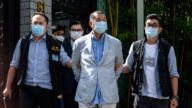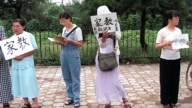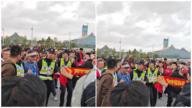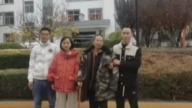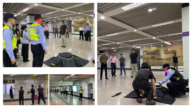【新唐人2012年6月7日讯】5号,中国环境保护部副部长吴晓青在新闻发布会上说,个别国家驻华领事馆自行开展空气质量监测,并经互联网发布空气质量信息,这样做在技术上既不符合国际通行的要求,也不符合中国的要求,外交人员不能干涉中国内政。6号,美国国务院回应说,不会因为中国的指责就停止发布数据,如果中国也发布美国城市的空气质量数据,美国不会反对。
6月5号“国际环境日”,中共国务院举行新闻发布会,中国环保部副部长吴晓青就“美国驻华使领馆监测PM2.5并发布相关数据”表示,“中国空气质量监测及发布,涉及社会公共利益,属政府的公共权力”。因此,个别驻华使领馆自行开展空气质量监测,并从互联网发布空气质量信息,既不符合维也纳有关公约,也违反了环境保护的有关规定。
他说,根据维也纳有关公约,外交人员有义务尊重当地国家的法律法规,不能干涉当地的内政。
自2008年以来,美国驻北京大使馆通过推特账户@BeijingAir,以每小时更新一次的方式,连续发布空气悬浮颗粒PM2.5的监测数据。目前已经有超过1万9千名网友跟踪关注。
“中国人民大学”教授毛寿龙在微博回应说,“根据国际法,美国大使馆及其上空属于美国的领土和领空,所以,美国大使馆检测和公布其空气污染指数,不是干涉内政。我们批评美国大使馆检测数据,才是干涉美国内政。”
大陆律师李天天指出,把美国使馆对空气质量的监测上升到“干涉中国内政”的政治高度,实在太荒谬。
李天天:“这事关老百姓健康的空气,应该有更先进的一个国家给监测,应该是好事情,可它们竟然反对,还提到那么高的高度,可见它们根本不是为人民服务的。如果是一个好的政府,正常的政府欢迎还来不及呢,只有黑帮政府才害怕真相暴露。”
吴晓青还说,中国将进一步加大监测信息发布力度,从今年下半年开始,74个城市所有国控监测点,都将陆续发布更加全面的空气质量监测信息。他要求外国驻华使领馆停止发布自测的空气质量信息。
6号美国国务院回应说,美国发布的数据只是为在中国的美国公民提供信息,没有干涉中国内政,因此不会停止发布相关数据。如果中国也发布美国城市的空气质量数据,美国不会反对。
当天,中共外交部发言人刘为民主持例行记者会就此事回应,中国没兴趣监测并发布美国PM2.5。
中国环保部门只公布颗粒直径较大的可吸入颗粒物PM10监测结果。事实上,直径在2.5微米以下的“颗粒” PM2.5,可以进入肺部甚至血液循环系统,对人体健康损害更大。
李天天表示,如果不是美国大使馆在Twitter发布PM2.5监测数据,并且在网上流传,中国民众恐怕永远都不会知道PM2.5是什么。
李天天:“这个事情共产党就要不高兴,只说明它们平时就没有告诉过老百姓真相,更不告诉人家外国人真相,人家只好自己监测呗。更可笑的是,中国民众根本不相信自己的政府而相信外国政府,它自己觉得没面子,然后它就不高兴,从来不想着自己去改正错误”
李天天指出,中国五分之四的城市空气质量达不到环保部门新制定的质量标准。灰霾天气不仅北京有,整个京津冀地区、长江三角洲、珠江三角洲等地的居民,每年有30%-50%的时间都生活在灰霾天气中。
采访编辑/李韵 后制/葛雷
Air-Quality Data Release by
U.S. Embassy in China Illegal?
June 5, Wu Xiaoqing, Vice Minister of Environmental
Protection of the Chinese Communist Party (CCP)
accused foreign embassy in China of
monitoring air-quality data and releasing the result.
Wu asserted that the practice does not conform to international
conventions, nor is it in line with China’s regulations.
Diplomatic personnel cannot interfere with China’s
internal affairs, Wu claimed.
June 6, the U.S. State Department responded by saying that
the U.S. will not stop releasing its air-quality monitoring data in face of criticisms by the CCP regime.
And that the U.S. would not object if China were to publish
the air quality data of American cities.
。
On June 5, World Environment Day, at a news conference,
the CCP’s Vice Minister of Environmental Protection Wu
Xiaoqing criticized the U.S. Embassy in China’s releasing
PM2.5 air-quality data.
Wu said, the monitoring and result release of the air quality
in China, which involves the public interest, is within the public power of the government.
Wu accused foreign embassies and consulates in China of
monitoring and publishing on internet their own report on air quality in China,
which does not abide by the relevant Vienna Conventions,
nor by environmental protection regulations.
Wu Xiaoqing claimed, based on international conventions,
diplomats are obligated to respect local laws and
regulations in the host countries, and cannot interfere with internal affairs locally.
Since 2008, the U.S. Embassy in Beijing has released hourly
readings of Beijing’s air quality via Twitter.
The Twitter account @ BeijingAir has thus far attracted
over 19,000 netizen followers.
Mao Shoulong, professor at Renmin University of China,
echoed this in his Microblog, saying, “Under international law,
the U.S. Embassy and the sky above is the U.S. territory
and airspace.
So, the U.S. Embassy’s air-quality testing and data release
did not interfere with the internal affairs (of China).
But our criticism of the U.S. monitoring air-quality data was
just interference with the domestic affairs of the U.S.”
China’s lawyer Li Tiantian thinks it so ridiculous that
the CCP politicized the U.S. Embassy’s air-quality monitoring.
Li Tiantian: “The air quality is related to Chinese civilians.
It is good that a developed country tested it for us.
But the (CCP) authorities openly opposed it and even politicized
this issue, showing they have never served the people.
A good and normal government would welcome it, I think,
only a gangster-government fears the truth being exposed."
Wu Xiaoqing said that China will further increase efforts
on data release of air-quality monitoring.
Since the second half of this year, all state-controlled monitoring
stations in 74 cities will release their monitoring reports.
Wu asked the foreign embassies and consulates to stop
publishing air-quality data “which is not representative".
In response, the U.S. State Department stated on June 6 that
the data released by the U.S. is simply to provide information
for American citizens in China, and is not interference in China’’s internal affairs.
Therefore, the air-pollution data release will not be discontinued.
If China were to report the U.S. cities’air quality the U.S. would not object.
The same day at a regular press conference, the CCP’s
Foreign Ministry spokesman Liu Weimin responded that
the (CCP) regime has no interest in monitoring and releasing
air quality data of the United States.
In China, the environmental protection departments only
publish PM10-monitoring results.
While particles of less than 2.5 microns in diameter (PM2.5),
which can enter the lungs and circulatory system,
are believed to pose more health risks.
Li Tiantian remarks that if not for the U.S. Embassy’s
releasing of PM2.5 monitoring data via Twitter,
the Chinese people might never know what PM2.5 is.
Li Tiantian: “The CCP just presents itself as unhappy
on this issue.
This only shows that they’ve never told the truth of it
to the public in our daily lives, nor to foreign countries.
So that’s why the foreigners monitored it on their own.
More ridiculous, the Chinese people don’t trust China’s
government but do trust the foreign one—a loss of face to it.
So it was disgruntled but never thought of
correcting its mistakes."
Li Tiantian points out that air quality in four-fifths of
China’s cities are sub-standard.
Each year, in the entire Beijing-Tianjin-Hebei area,
the Yangtze River Delta, the Pearl River Delta, among others,
haze weather accounts for 30% -50% of the
time of any period.


